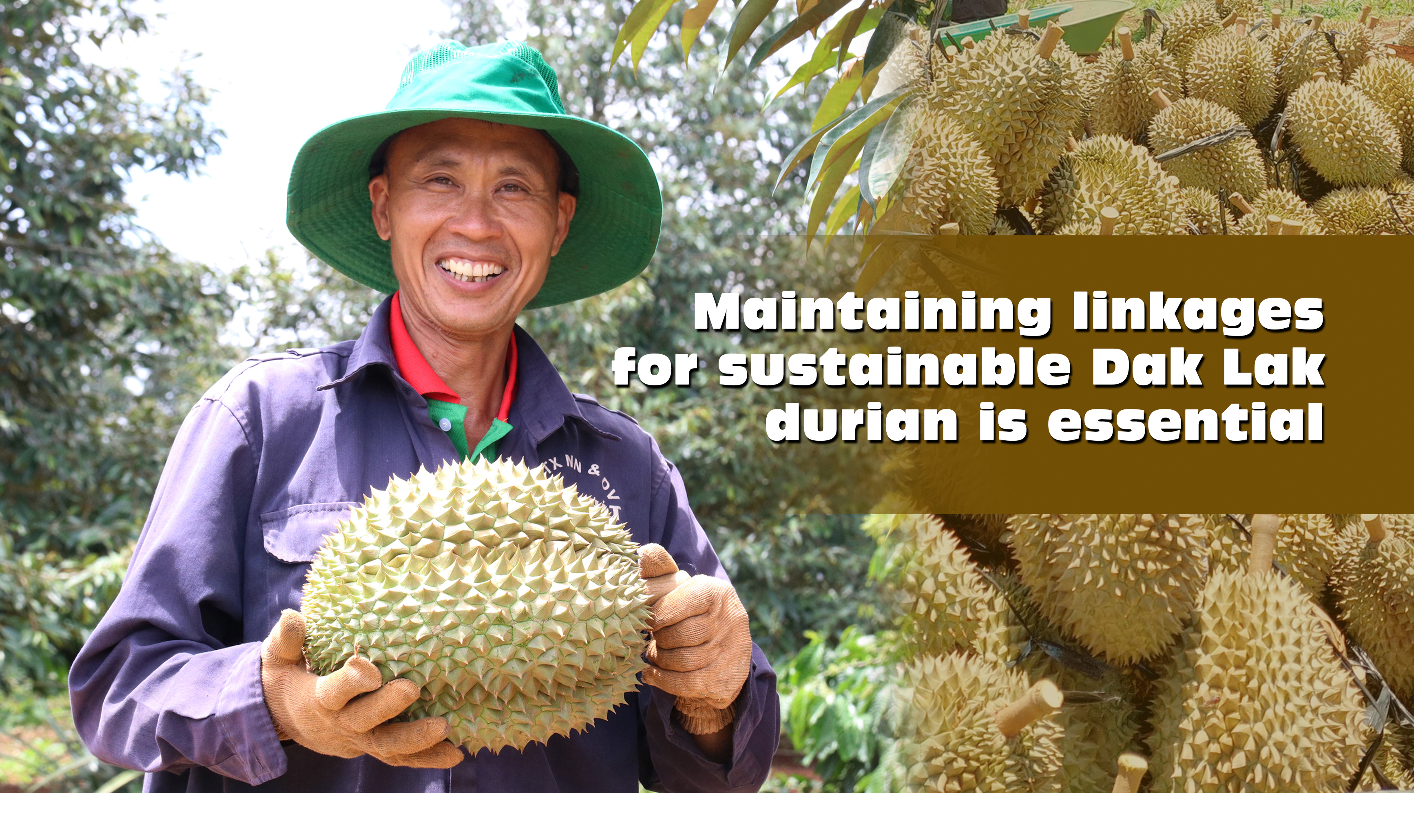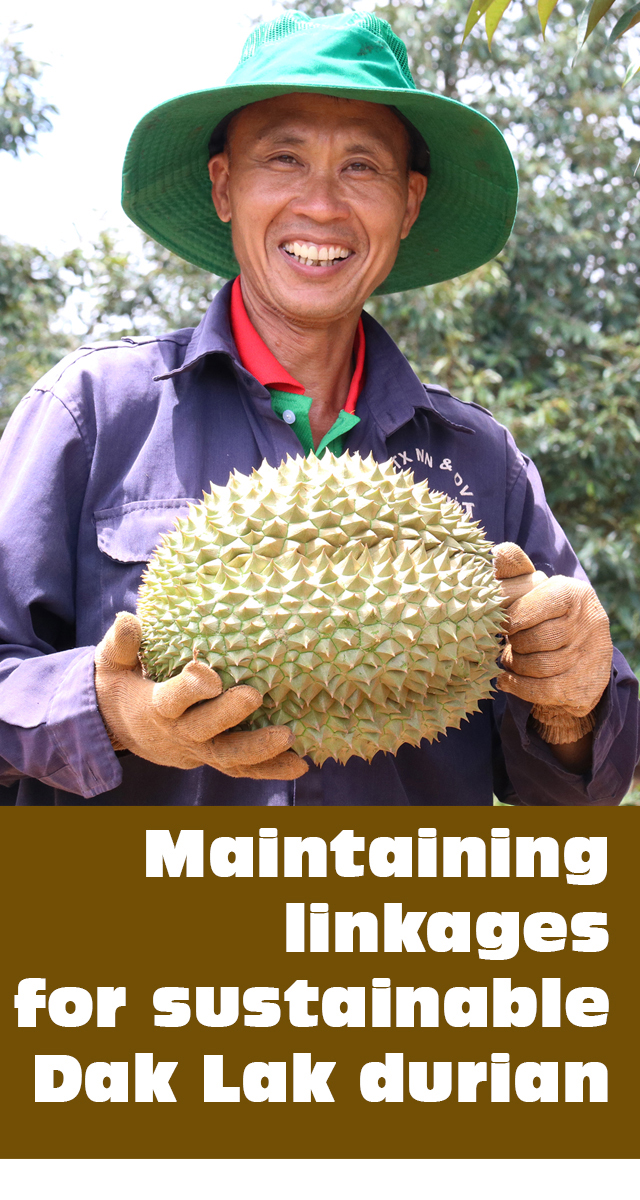
In the crop year 2023, Dak Lak will have more than 22,000 hectares of durian that can be harvested, with an expected output of over 200,000 tons. This is the second year that Dak Lak has officially exported durian to the Chinese market, so the purchase and sale of this product have taken place ebulliently in recent months.
At this time, the localities owning durian areas in Dak Lak are bustling with the scene of purchase and sale, and a team of brokers also appears.
According to a broker who was looking for a garden to finalize the price in Buon Ho Town, through relationships, this person was able to connect with Chinese traders. After that, this person, along with two other people, got to the durian gardens of the people to make deals. The offered price of durian garden by this group fluctuates from VND 80,000 to VND 90,000/kg. The durian brokers all come from realtors.
Mr. Bui Thanh Huynh, Director of Buon Ho Agricultural Cooperative, said that the durian of cooperative members has all had a good season this year, and yield increased by about 20% compared to the previous year.
There is still about a month left until the durian harvest, but the situation of some durian brokers from other places coming to "blow up" the price (approximately VND 100,000/kg) appeared, causing market disturbances and making many people hesitate to sign a purchase and sale contract with affiliated units.
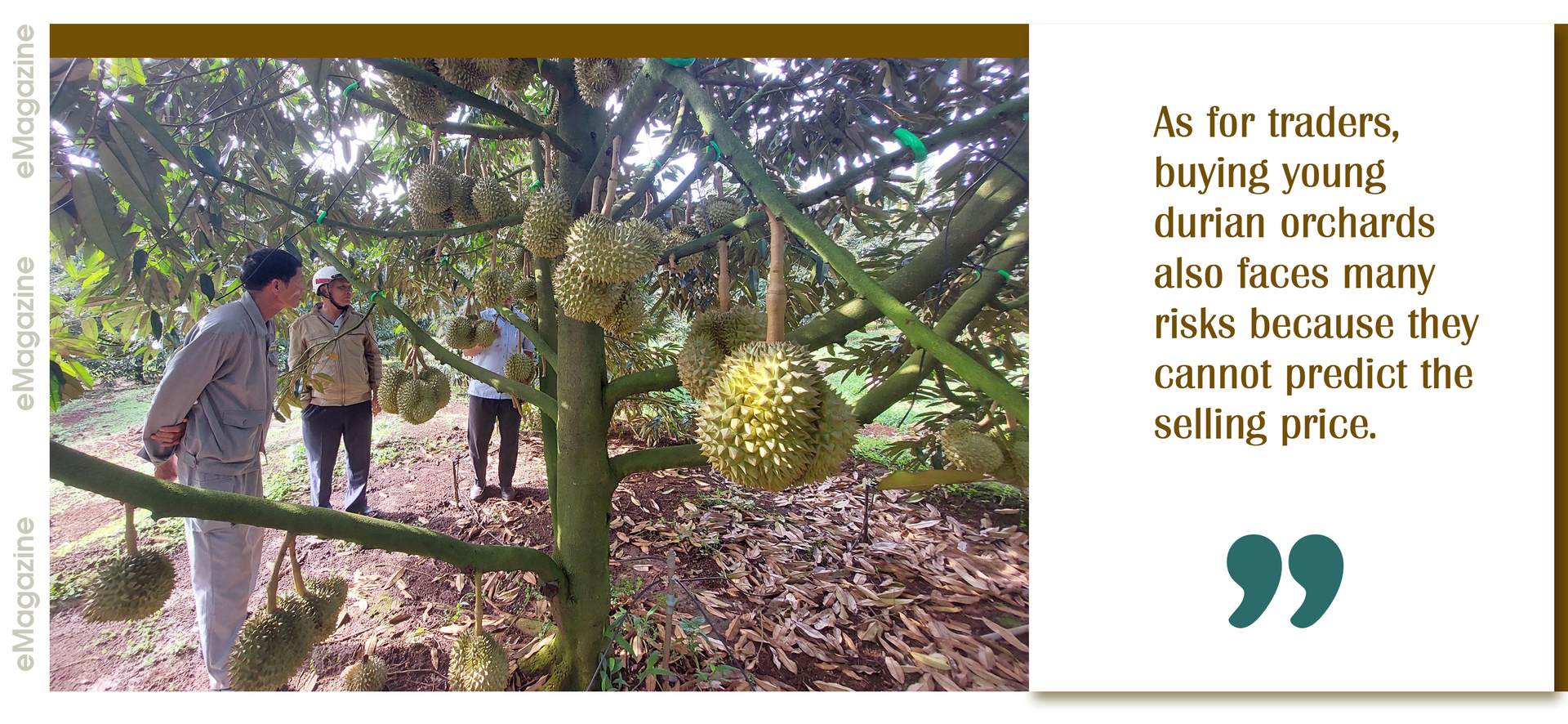
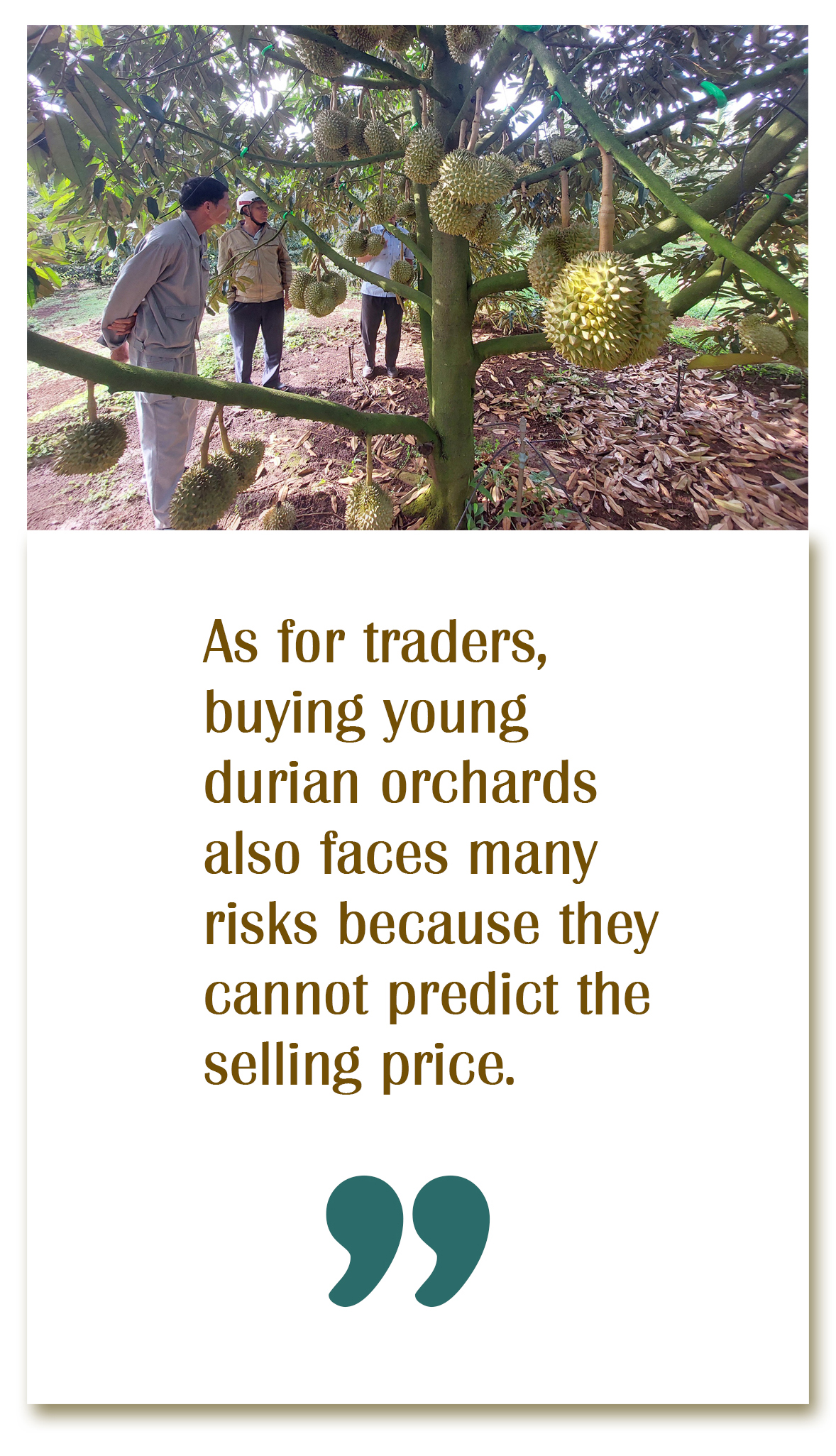
"Many families are forced to lock their garden doors to avoid being annoyed. On average, every day, if the door is open, there must be dozens of brokers asking to buy durian and negotiate the price to close the deal on the durian garden. I have never seen a year with the situation of brokers 'blowing up' the price and causing price disturbances like this year," said Mr. Huynh.
According to Mr. Huynh, the broker’s finalizing a higher price than agents and purchasing units is not necessarily happy but has many potential risks. Especially the situation of brokers holding the garden without making an appointment to return, causing the orchard to be neglected, susceptible to pests or diseases, or the tree to be exhausted due to having to nourish fruits for too long, which will affect the growth and yield of the next crop.
The situation of selling young durian gardens has appeared for many years in many forms. After the two sides finalize the selling price, the trader places a deposit and takes care of the orchard until the fruits are harvested. After harvest, the trader returns the garden to the owner. In some cases, the trader only deposits money and receive the products but do not take care of the garden.

According to many households that used to sell young durian gardens, despite taking less care, this form causes losses for durian growers. That is the situation: after locking in the price, buyers often used too much chemical fertilizers and pesticides to stimulate the fruit, causing the trees to be depleted, shortening their lifespan, and reducing the yield in the next crop.
As for traders, buying young durian orchards also faces many risks because they cannot predict the selling price. In previous years, there used to be a garden with a high pegged price but a low selling price for the main crop, so many traders had to give up their deposit and cancel cutting durian.
Mr. Nguyen Ngoc Giao, Head of the Cu M'gar Department of Agriculture and Rural Development, said that this year, the price of durian has doubled compared to every year.
According to Mr. Giao, it is very valuable for traders to visit the orchard and offer purchase, forming a consumption linkage chain. However, the situation of some traders in other places, through brokers coming to Cu M'gar district to buy durians and finalize the garden at high prices, caused market disturbances.
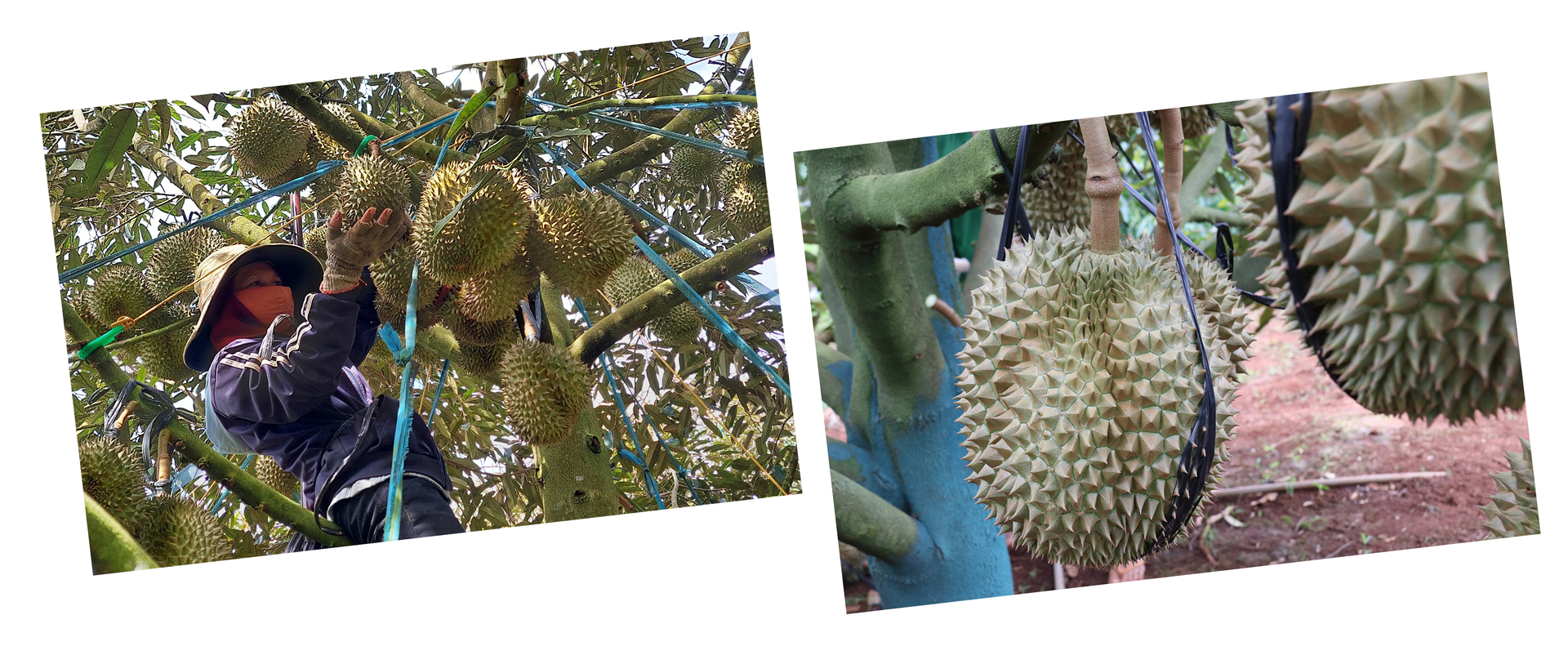
"There are gardens that have fixed the price, but traders ask the garden owner to cancel the deposit to fix a higher price for the latter. This will lead to the consequence that if farmers do not stay alert, there will be competition to buy and sell and a violation of the signed contract.
Traders only fix the price, and they choose good fruits in the first cut. If the price goes up, there is no problem. But when the price drops, the rest is not sure to be bought. Or in some cases, traders will buy but ask the garden owner to reduce the price; otherwise, the durian will be left to fall and cannot be sold," analyzed Mr. Giao.
The head of the department added that, as for fruit, harvest time is very important. If durian is ripe without a buyer, it will spoil immediately.
"I talked with some people who are willing to return the deposit of the former when the latter pays a higher deposit. The fact that businesses in other places voluntarily meet people, not through the district, to raise the price of durian will affect the linkage chain between businesses, cooperatives, cooperative groups, and people that have been formed for a long time,” said Head Nguyen Ngoc Giao.


For many senior durian farmers with experience in trading, facing the situation that brokers get everywhere to offer a high price, they are in no hurry to receive the deposit. These farmers judged that the early closing with high prices would lead to many consequences later, and the loser is the farmer.
Mr. Nguyen Duc Quan (living in village 4, Ea Ngai commune, Krong Buk district, Dak Lak) has received tens or even hundreds of calls from storks asking to see the garden and finalize the price, but he refused.
Mr. Quan’s family grows 5,000 m2 of durian, and every year the garden harvests nearly 20 tons of fruit. Last time, many people visited the garden and fixed a price above VND 90,000/kg, but he refused, even inviting them out of the garden.
According to Mr. Quan, the family has associated with an enterprise from beginning to end. In the contract, there is a clause stating that at the time of harvest, the enterprise side would inspect the garden, and the two sides would agree to trade on a market price.
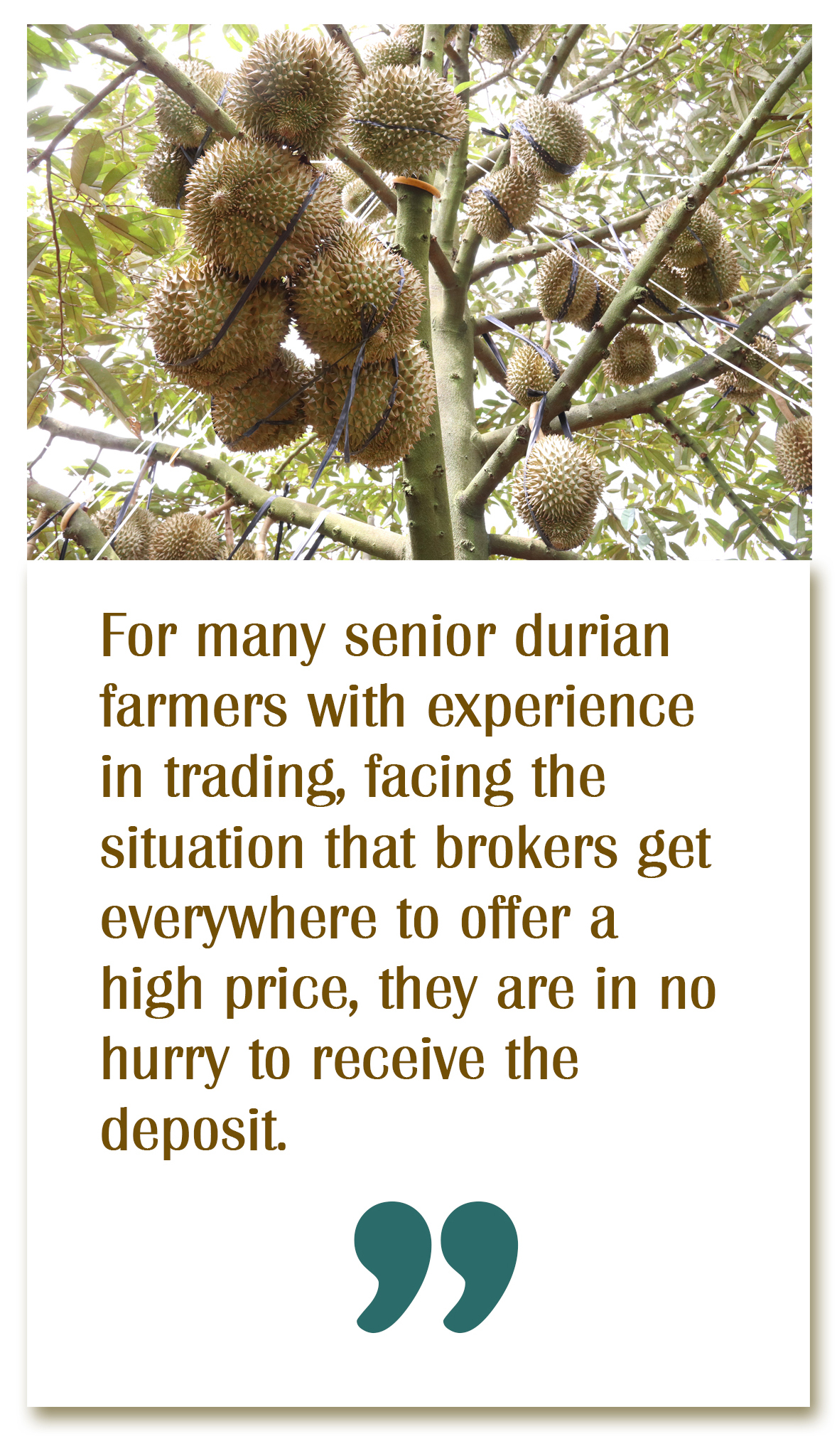
"The current price of durian is just floating, 'fictional'. Brokers come and offer a really high price and make a contract, but in the end, it is just a piece of paper with no one as a witness. The deposit is high at first, but when the time to cut the fruits comes, the price drops. Brokers only cut equal or more than the deposit amount and then leave, holding the garden until all the fruits fall, and there’s nothing we can do about it," Mr. Quan said.
"It is not easy for people to make agricultural products. If the trading is not convenient, not only people but also businesses have to suffer. Businesses and people need to stick together for sustainability," Mr. Quan shared.
According to Mr. Nguyen Xuan Nhi, Leader of the Dong Tam Sustainable Durian Production Cooperation Group, Krong Buk district, the unit has 55 hectares of durian with a total output of more than 1,600 tons. Dong Tam Cooperative Group is currently associated with Huong Cao Nguyen Agricultural Service and Production Joint Stock Company to grow durian according to VietGAP standards.
“The current durian prices are ‘fictional’. Even companies qualified to export through the official route do not dare to make purchases at the garden. It is mostly the brokers and traders who come to make those deals just to keep hold of the gardens”.
“Garden owners want to have an official price to sign the contract, not the current “fictional” price. Because signing at the current price means danger because there is a possibility that the garden will be put on hold, and it actually happens in other areas.
I encourage the members of the cooperative group to remain calm. Durian still has 15-20 days to have the first cutdown, only then should they consider a purchase contract, and they should sign contracts with businesses with the potential to buy and export,” said Mr. Nhi.
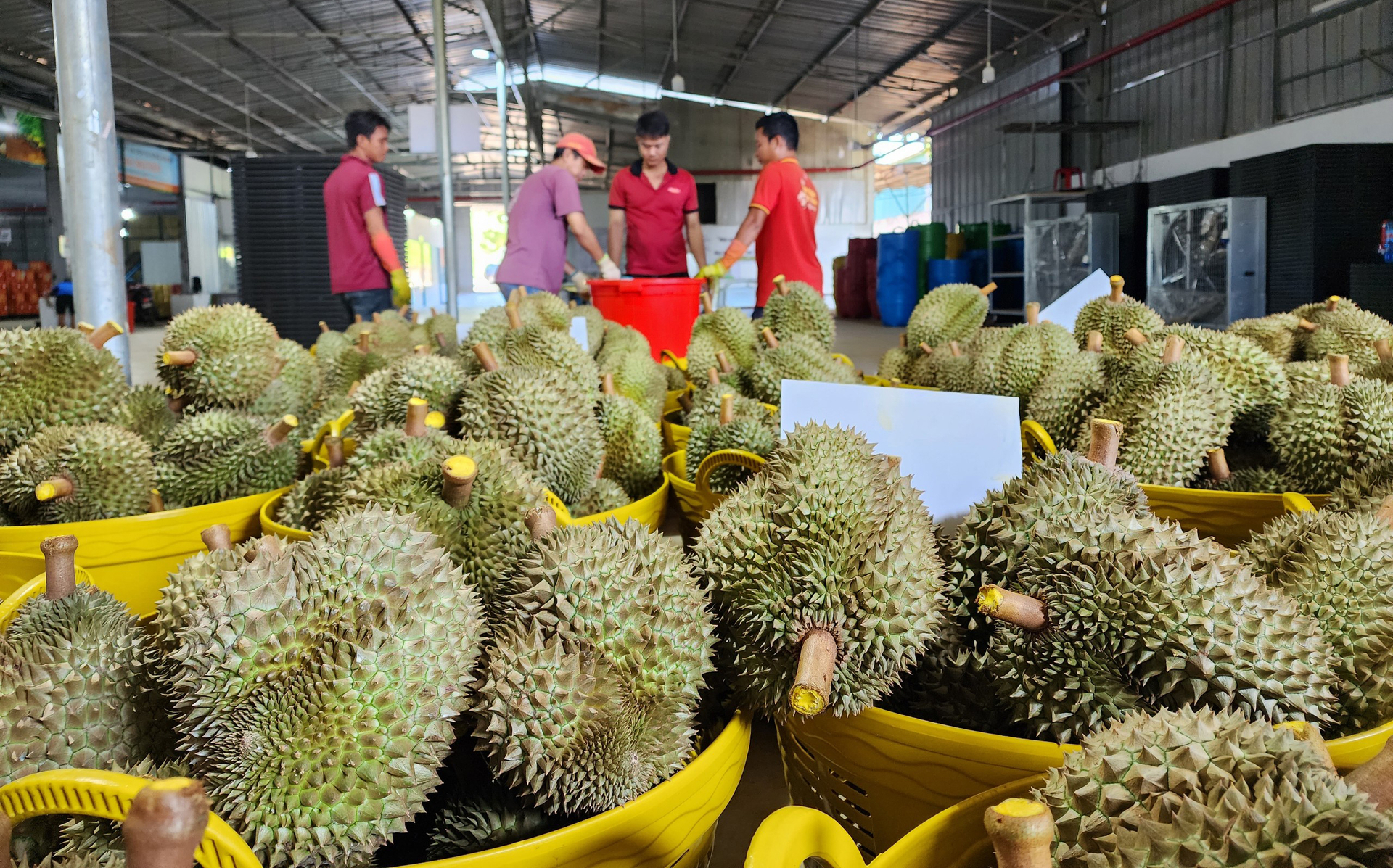

Ms. Ngo Tuong Vy, General Director of Chanh Thu Fruit Export-Import Co., Ltd., said that the current situation is that farmers return the deposit when the latter company offers a higher price. The farmers’ cancellation of the deposit agreement has affected the reputation as well as the economic and financial situation of the business.
According to Ms. Vy, when signing a commercial contract with a foreign customer, the enterprise cannot justify any reason to cancel the contract. If the business cancels the contract, it is required to compensate, and the biggest damage is to reputation and brand.
"With the price of VND 60,000–65,000/kg fixed with farmers before, farmers have earned a lot of profit. Actually, the farmers’s cancellation of the deposit is derived from human greed and noncompliance with linkage principles. Or currently, it is also similar for some growing area codes, where other businesses buying a garden at a high price will affect the people around them.
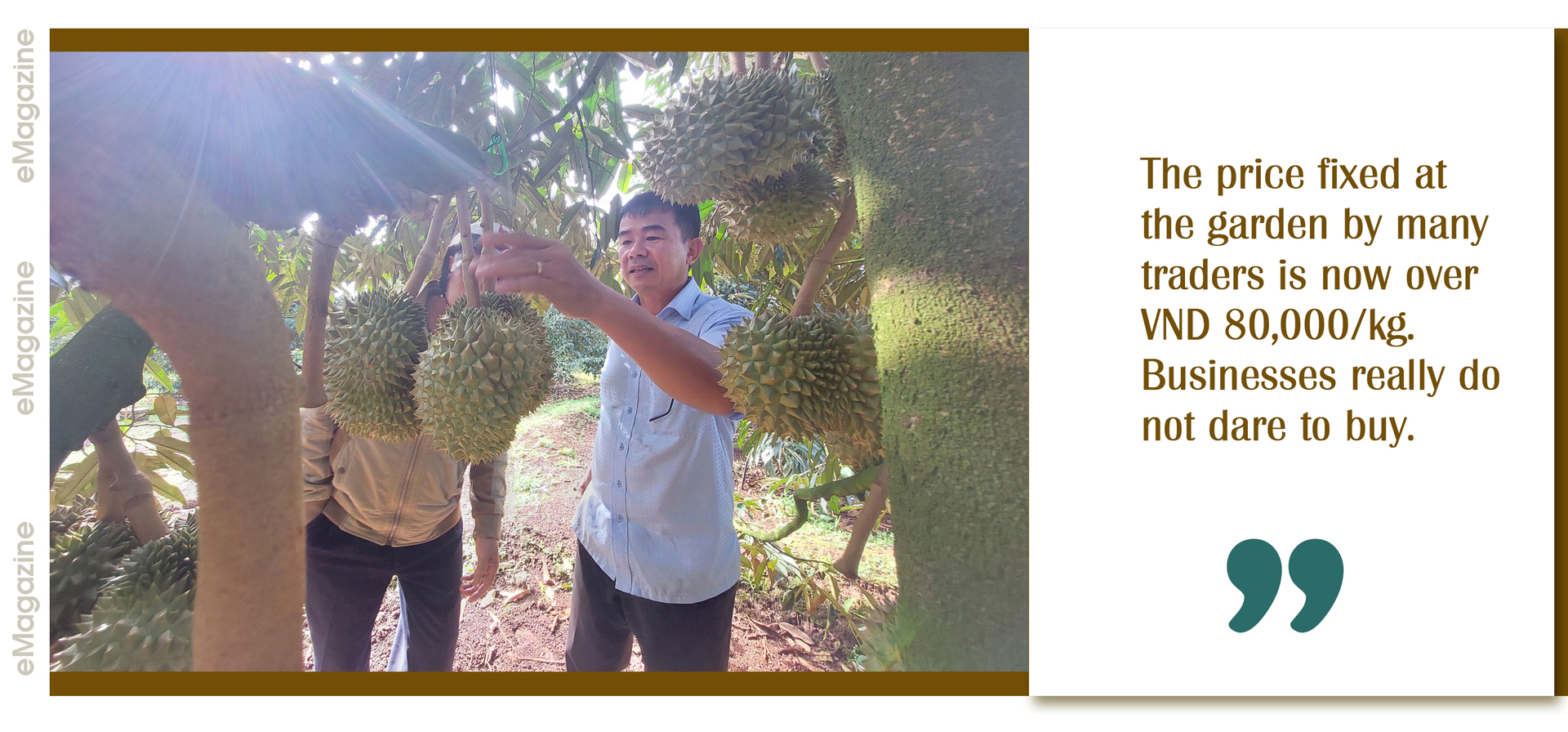
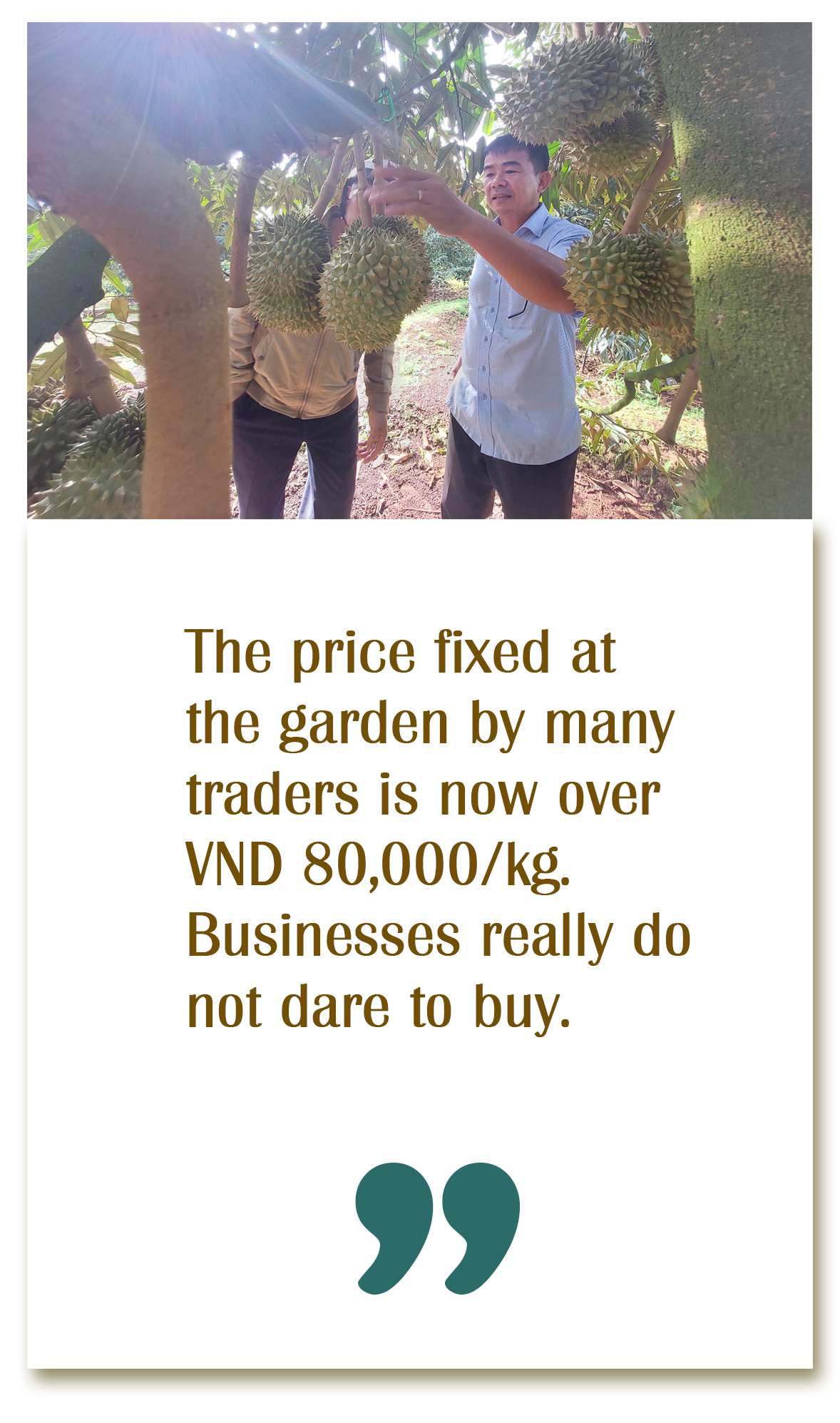
For example, a garden with a rate of 90% of first-class goods can be purchased at a price of VND 80,000/kg. As for the garden with 60% of first-class goods, only VND 65,000–70,000/kg can be offered. However, farmers do not understand this problem and still compare the buying price, leading to the cancellation of the deposit," said the General Director of Chanh Thu.
According to the female General Director, we do not now have a discipline on price and no legal binding in the linkage. Therefore, farmers and cooperatives need to calmly rethink the price because it is uncertain when the harvest time comes and the price is still as high as it is now.
"In China, there are storms and floods, and this year’s weather has rained a lot, so the durian quality is not yet known. Therefore, farmers cannot know what a reasonable buying price is for the business. This is a lesson about linkage when everyone puts their greed above all else, even businesses, traders, and people.
The price fixed at the garden by many traders is now over VND 80,000/kg. Businesses really do not dare to buy. Even with a purchase, the rate of first-class achievement must be calculated according to the contract price with the customer. As for traders, after closing, if the market price is down, they will hold the garden, not cut the frutis, or reduce the price. Unlike traders, businesses cannot do this. Because doing this will greatly damage the business’s reputation, making it very difficult for businesses to purchase and export durians," said Ms. Tuong Vy.
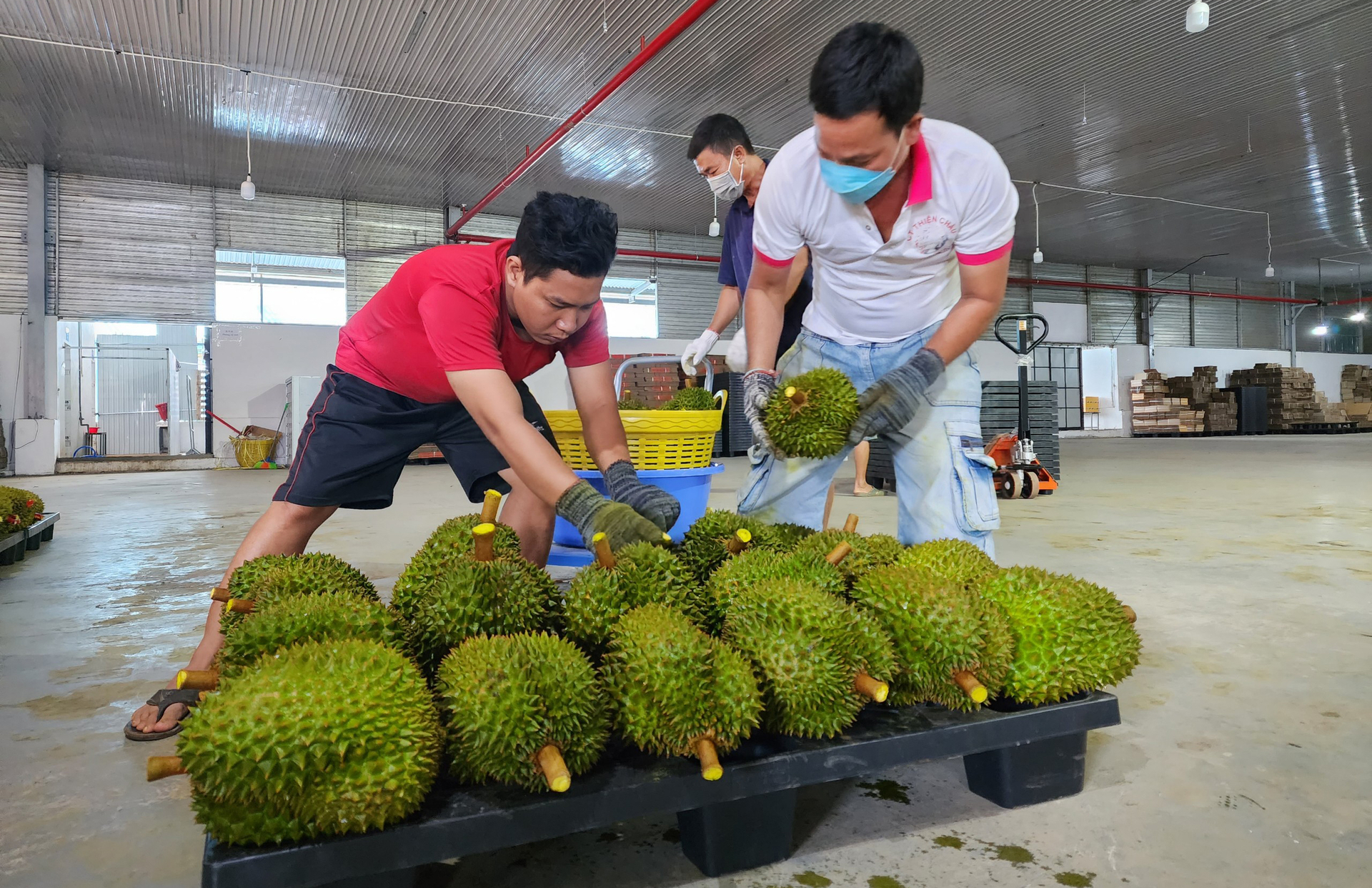
In response to the situation where people cancel the deposit, causing the linkage chain to be lost, the Cu M'gar Department of Agriculture and Rural Development has warned to ensure a long-term value chain.
Specifically, this locality asked people to be on guard against the increase in prices from traders and barn owners. People need to keep the long-standing linkage chain sustainable. It will not be sustainable to break the linkage chain just because of the market price. Affiliated businesses also need to ensure that trading follows market prices.
Similarly, Ms. Ngo Thi Minh Trinh, Vice Chairwoman of the Krong Pak District People's Committee, said that because the main harvest time has not yet come, there is a situation of durian brokers raising prices, but not significantly. Most of the locality’s durian area belongs to cooperatives, affiliated businesses, and growing area codes, so linkages in caring, harvesting, and export are very strong.
"The district also disseminates so that people need to cooperate in the long term, according to the chain, with the right quality, avoiding chasing after ‘fictional’ prices. The working groups of the district and commune police always monitor and prevent groups that push prices, indemnify, and cause the loss of security and order in the locality,” Ms. Trinh said.
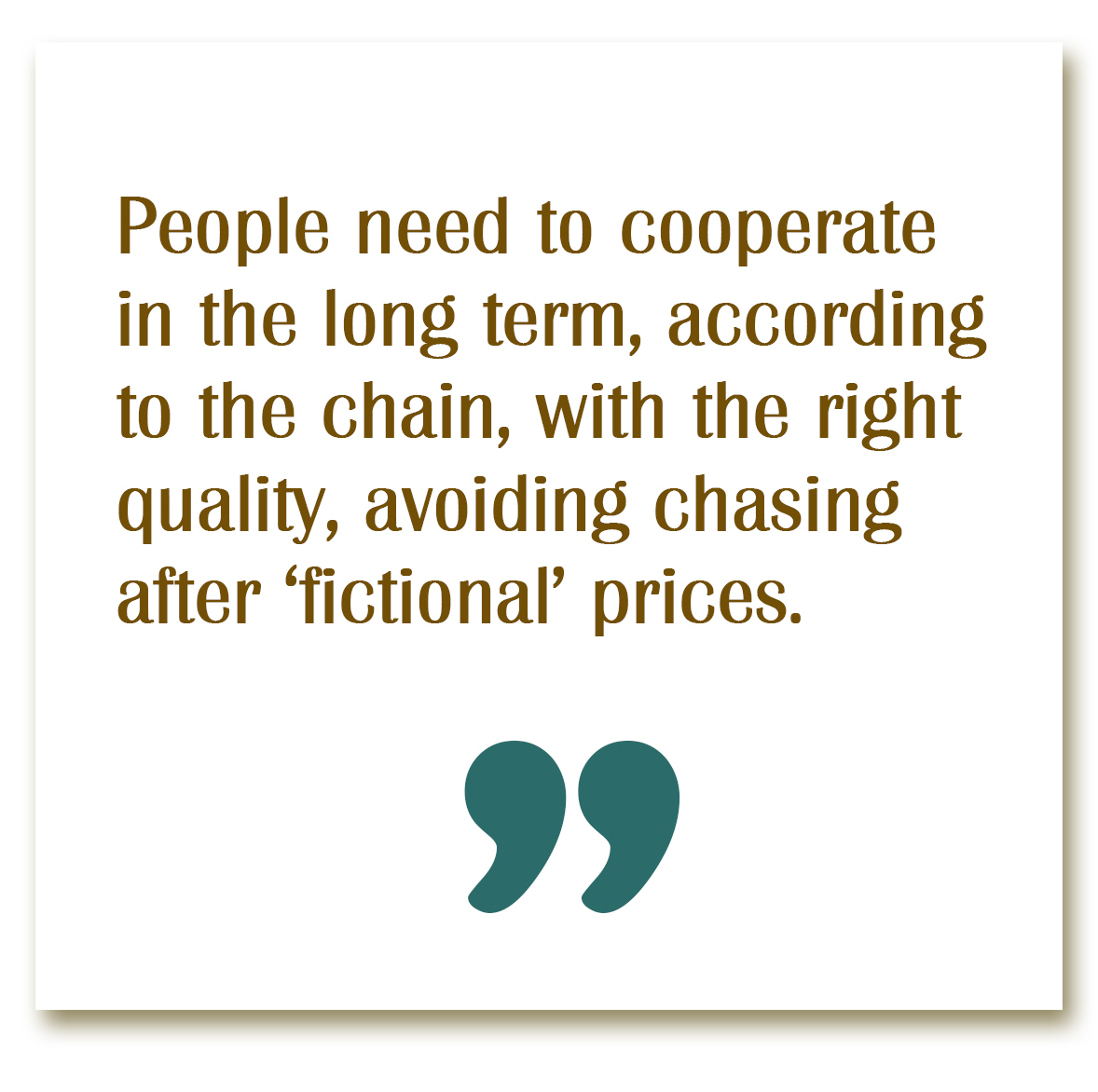
Mr. Vu Duc Con, Deputy Director of the Department of Agriculture and Rural Development and Chairman of the Dak Lak Durian Association, assessed that the 2023 durian crop has many advantages. First of all, it is consumed at high prices, and the output is more stable because durian has been officially exported to the Chinese market. Besides, people invested in and took better care of their gardens, so the yield was quite high. The output in the 2023 crop reached about 200,000 tons, an increase of 20,000 tons compared to the crop in 2022.
However, the biggest disadvantage of this year's durian crop is that the purchasing situation is very "hot", so coming to a fixed price early will create disadvantages and lead to consequences because there will be many contracts difficult to execute as signed when the price fluctuates constantly during the harvesting process.
In addition, if farmers keep chasing after prices, sustainable development and long-term association will be overlooked, and the quality of products in this crop will be affected, not to mention the sustainable development of the durian industry.
"The association only recommends that gardeners need to be calm and should not be impatient to fix the price early, which can be detrimental to themselves and buyers. In addition to the price, it is necessary to pay attention to the sustainable cooperation and association with businesses and purchasers investing in each crop or in the long term," emphasized Mr. Con.
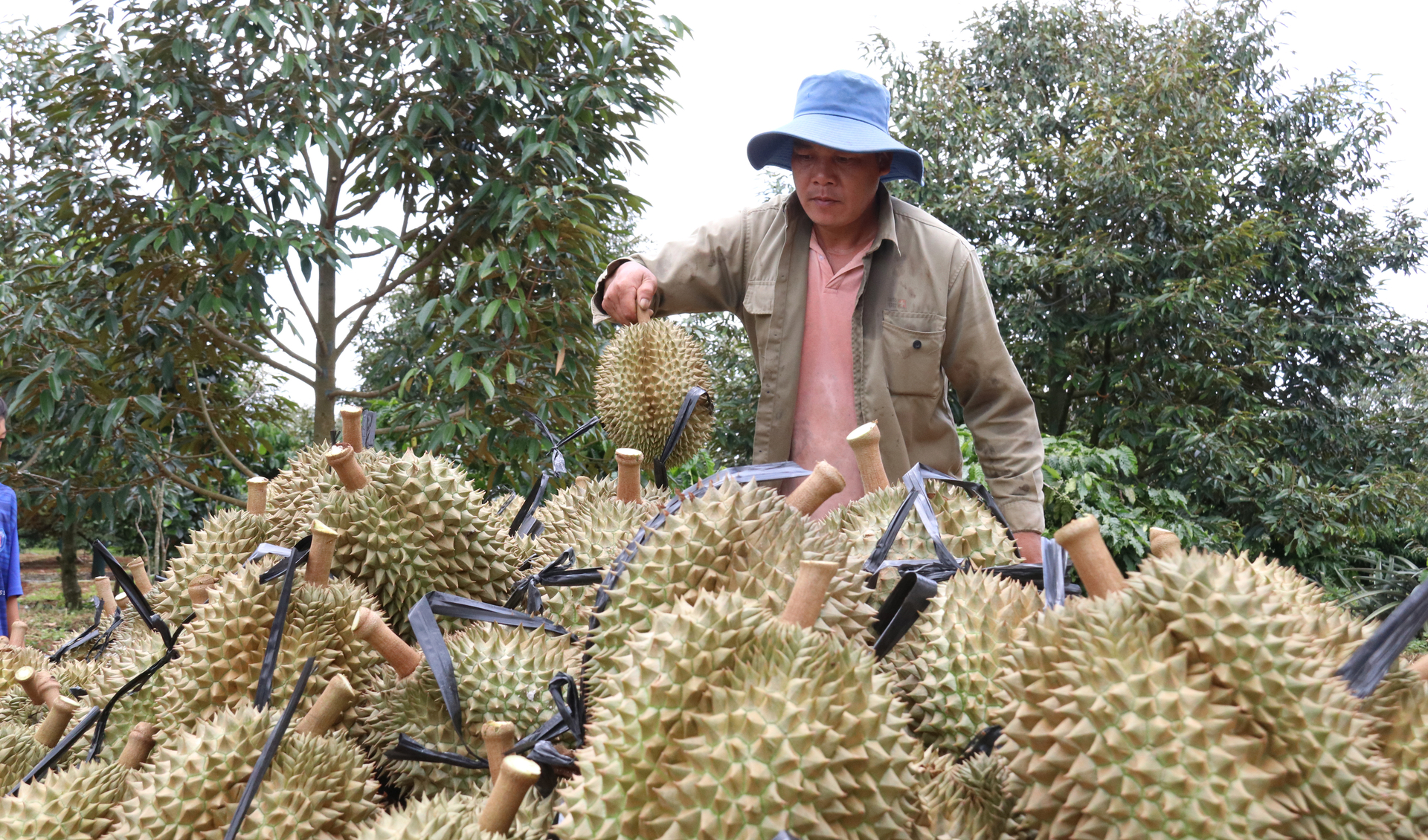
Content: Minh Quy - Tuan Anh
Photo: Minh Quy - Tuan Anh
Translated by: Huyen Vu Thu


